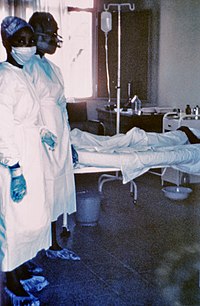
Photo from wikipedia
Crimean-Congo hemorrhagic fever (CCHF) is a tick-borne zoonotic viral disease. The aim of this study was to evaluate the association between inflammation, coagulation and endothelial dysfunction in CCHF. The study… Click to show full abstract
Crimean-Congo hemorrhagic fever (CCHF) is a tick-borne zoonotic viral disease. The aim of this study was to evaluate the association between inflammation, coagulation and endothelial dysfunction in CCHF. The study population consisted of 40 patients and 50 healthy controls. Alanine aminotransferase (ALT), aspartate aminotransferase (AST), endocan, high sensitive C-reactive protein (hsCRP), international normalized ratio (INR), prothrombin time (PT), activated partial thromboplastin time (aPTT) and platelets values were determined in blood samples. Median hsCRP (p < 0.0001), ALT (p < 0.001), AST (p < 0.001) and aPTT (p < 0.001) values were found to be higher in CCHF patients than in the healthy control subjects. In contrast, median endocan (p = 0.0006) and platelet (p < 0.001) concentrations were found to be lower in CCHF patients than in healthy controls. Serum hsCRP concentrations positively correlated with PT, aPTT and INR in CCHF patients, whereas serum endocan levels were not correlated with hsCRP, PT, aPTT and INR. In conclusion, endothelial dysfunction is one of the key steps in CCHF disease development and serum endocan may be used as a biomarker to evaluate endothelial dysfunction in patients. There is no relationship between increased inflammation and endothelial dysfunction. Coagulation abnormalities might be related to the impaired hepatic synthetic function of coagulation factors. Increased hsCRP concentrations may have a compensatory role in restoring impaired hemostasis in CCHF. Further research is needed to confirm these findings and to examine possible explanations.
Journal Title: Archives of Virology
Year Published: 2017
Link to full text (if available)
Share on Social Media: Sign Up to like & get
recommendations!